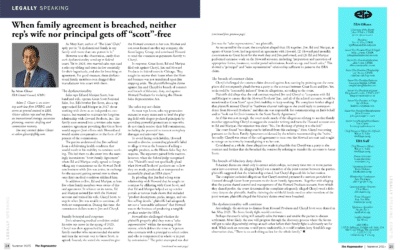By Adam C. Maxwell and Adam N. Hirsch, Employment Practice Group Partners — SFBBG LLC
Illinois employers are about to enter one of the most consequential employment-law shifts since 2020. During the 2025 legislative session, the General Assembly passed a wide slate of worker-protection laws, almost all of which take effect on January 1, 2026.
The changes expand technical legal rights and directly affect day-to-day operations, handbook language, contract drafting, HR decision-making, and compliance costs. Here are the practical takeaways business owners, executives, and HR leaders should be preparing for now:
- Your Employment Agreements Will Need To Change
Illinois’ Workplace Transparency Act (WTA) was originally enacted to limit overly restrictive employment agreements. Amendments effective in 2026 significantly expand the WTA’s reach. Key takeaways for employers:
A. No more mandatory “take-it-or-leave-it” clauses on what were largely considered
“standard” core terms
Starting January 1, 2026, employers may not impose any of the following as non-negotiable conditions of employment:
- Applying non-Illinois law to an Illinois employee
- Requiring a non-Illinois venue for disputes
- Shortening the statute of limitations for employee claims
B. Confidentiality clauses will require separate consideration
Confidentiality is often considered a standard term in connection with separation or severance agreements as a way to obtain a “clean break” without risk of a departing employee narrating a negative experience and commenting on the terms of his or her separation. Beginning January 1, 2026, if an employer wishes to impose a duty of confidentiality on an employee, the employer must provide that employee with separate consideration, which is something employers will most often encounter in the context of separation and severance agreements.
Employers can expect and should budget for increased severance costs and slower negotiations in planning terminations or restructurings. Quite literally, employers will have to ask themselves how much they are willing to pay for an employee’s confidentiality.
C. Employees’ rights to engage in “concerted activity” must be acknowledged
As a drafting and compliance exercise, agreements will need updated language to include an acknowledgement of employee rights to have workplace discussions about conditions, organizing efforts, and participating in agency investigations. Failure to include the required acknowledgments could invalidate other agreement provisions.
D. Heightened Consequences for Violations
Employers can expect higher litigation exposure and increased leverage for employees in disputes involving confidentiality, arbitration, or restrictive covenants. In addition to attorneys’ fees, employees will be permitted to seek consequential damages, including costs for defending against a wider array of contract claims.
- Expect Faster Paths to Court and Higher Penalties
Several procedural hurdles involving claims brought pursuant to the Illinois Human Rights Act have been removed:
- Employees can immediately opt out of the administrative process after filing a charge.
- Fact-finding conferences—previously mandatory—are now optional.
- Civil penalties for violations have expanded.
Employers can expect faster-moving disputes, more immediate litigation, and increased financial exposure. Employers should revisit their internal investigation processes, training, and documentation protocols to ensure the company is prepared for quicker claims escalation.
- Paid Lactation Breaks
Under the Nursing Mothers in the Workplace Act, employees will be entitled to paid, “reasonable” lactation breaks for up to one year following childbirth, and employers cannot require the use of PTO. Payroll, timekeeping systems, and supervisor training must reflect these protections.
- Two Brand New Illinois Employment Laws Every Employer Should Note
A. The Workers’ Rights and Safety Act
This law prevents Illinois from adopting weaker worker-safety standards even if federal OSHA standards are rolled back. Employers in manufacturing, construction, warehousing, and logistics should expect no relaxation of standards, and potentially increased state-level rulemaking in 2026.
B. Family Neonatal Intensive Care (NICU) Leave Act
The law will provide for a new category of job-protected leave—which is in addition to FMLA—for parents of newborns in NICU care, Employers with 16–50 employees must provide up to 10 days of unpaid leave, job-protected leave, and employers with 50+ employees must provide 20 days of leave. Unlike FMLA leave, NICU leave does not impose eligibility standards based on length of service or type of employment (i.e., part-time or full-time). Employers should update leave policies and ensure consistency across HR and payroll platforms.
Conclusion
The 2026 changes represent a meaningful shift toward further employee protections and will require nearly every Illinois employer to revisit their agreements, policies, and practices.
Illinois employers should use the remainder of 2025 as a planning and transition period to prepare for the 2026 changes. The first step is a proactive audit of all employment-related documents to ensure they comply with the new rules before January 1, 2026. Employers should also prepare to train managers and HR teams on the expanded rights and protections employees will have under the amended statutes, including concerted-activity rights, paid lactation breaks, NICU leave, and updated reporting obligations under the IHRA. Because claims can now move to litigation more quickly and carry heightened penalties, businesses should also strengthen their internal documentation and investigation practices, and plan to escalate earlier in the life of a claim.
Employment Package Documents Affected:
Offer letters, independent contractor agreements, confidentiality and restrictive covenant agreements, onboarding packets, and severance/separation agreements may need to be revised. Multi-state employers will need to adopt Illinois-specific forms and processes, as a single national template will no longer satisfy the state’s enhanced employee-protection requirements. Most employers will not overhaul their entire contracting process or begin negotiating individual employment terms, but will take one of several practical compliance paths that balance these new requirements with administrative efficiency.
Contact
SFBBG is advising employers across industries on proactive compliance planning, audit strategies, agreement redrafting, and preparation for the January 2026 transition.
If you would like to discuss how these changes affect your business, contact:
Adam C. Maxwell — [email protected] or Adam N. Hirsch – [email protected]
This article has been updated as of November 24, 2025.



